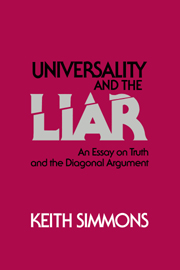Book contents
- Frontmatter
- Contents
- Preface
- Chapter 1 The Liar paradox
- Chapter 2 The diagonal argument
- Chapter 3 The diagonal argument and the Liar, I
- Chapter 4 The diagonal argument and the Liar, II
- Chapter 5 A medieval solution to the Liar
- Chapter 6 A singularity solution to the Liar
- Chapter 7 A formal account of singularities
- Chapter 8 Applications and further singularities
- Chapter 9 Semantic universality
- Notes
- Bibliography
- Index
Chapter 6 - A singularity solution to the Liar
Published online by Cambridge University Press: 19 October 2009
- Frontmatter
- Contents
- Preface
- Chapter 1 The Liar paradox
- Chapter 2 The diagonal argument
- Chapter 3 The diagonal argument and the Liar, I
- Chapter 4 The diagonal argument and the Liar, II
- Chapter 5 A medieval solution to the Liar
- Chapter 6 A singularity solution to the Liar
- Chapter 7 A formal account of singularities
- Chapter 8 Applications and further singularities
- Chapter 9 Semantic universality
- Notes
- Bibliography
- Index
Summary
The Liar is a product of our ordinary semantic concepts. It shows that we lack a complete grasp of our familiar notions of truth and falsity. Its proper setting is natural language, in which our ordinary semantic terms appear. The Liar is not primarily a “formal” or “technical” problem. If a formal theory of truth is to provide a solution to the Liar, it must be a theory of natural language and, in particular, a theory of our concept of truth.
I argued in Chapters 3 and 4 that a number of recent non-Tarskian treatments of the Liar do not capture our ordinary semantic concepts. For each of these accounts, there are semantic concepts available to the speaker of English that cannot be expressed within the formal theory, on pain of contradiction. Diagonal arguments establish that these semantic concepts can be expressed only in a metalanguage. So the theory does not provide a model of natural language. And a Tarskian hierarchy is forced on the purportedly non-Tarskian account.
This may seem to support a Tarskian resolution of the Liar: If the hierarchy is inevitable anyway, why not accept it from the outset? There are, I believe, a number of reasons why we should reject the Tarskian route, reasons that will emerge in the course of these final chapters. One obvious worry is this: Hierarchical theories do not seem to provide a natural account of our semantic concepts.
- Type
- Chapter
- Information
- Universality and the LiarAn Essay on Truth and the Diagonal Argument, pp. 99 - 117Publisher: Cambridge University PressPrint publication year: 1993



